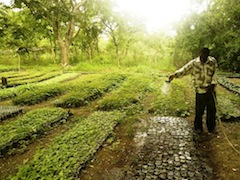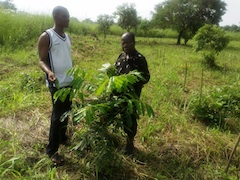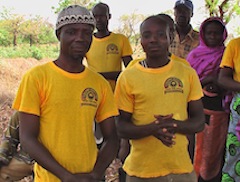|
|
|
|
 |
|
Ghana
 |
 |
 |
Some of the tree seedlings being grown for the Evangelical Presbyterian Church of Ghana and its RELBONET faith partners in Tamale, Ghana |
Evangelical Presbyterian Church in Ghana
The Evangelical Presbyterian Church in Ghana is one of 26 Christian, Muslim and Hindu faith groups in sub-Saharan Africa that launched its long-term environmental action plan at ARC's Many Heavens, One Earth, Our Continent Celebration in Nairobi, Kenya, in September 2012.
About the Church
The Evangelical Presbyterian Church in Ghana has 150,000 members and works in 147
districts with 834 congregations and 450 pastors.
It runs 970 schools (from kindergartens
to high schools) as well as a university and two colleges of education. It runs sanitation
clubs in basic and secondary schools in Northern Ghana and promotes the solar
disinfection of water project in schools and rural communities.
Working with RELBONET
The EPC also works through the Religious Bodies Network on Climate Change
(Relbonet) in Ghana, a new interfaith partnership for advocacy in Ghana set up in 2010 to
include faith-based organisations in national consultations on climate change.
Members
include 13 major mainline Protestant, Pentecostal and Charismatic religious bodies,
Ghana’s three major Muslim organisations and the Federation of Muslim Women
Associations.
 |
 |
 |
Dr Richmond Nfodwo of the EPC is shown inspecting a field of tree seedlings planted in Adaklu-Waya, Ghana, in 2011 with local volunteer David. |
Relbonet reaches more than five million Ghanaians every week. EPC hosts
the national secretariat of the Network and this brings huge potential to disseminate
climate change and environmental messages. Its Secretariat is hosted by the EPC.
Environmental work
The EPC has been extensively involved in social development work for over five decades. It is also involved in environmental work. In 2002, for example, the EPC launched an environmental protection project in Northern Ghana where
land degradation is severe, resulting in an increased threat of desertification.
This involved
tree planting, creating 100 acres of reforested woodlots and alternative livelihood training
to rural farmers to combat excessive harvesting of trees and shrubs for firewood.
In 2010, the EPC won the Ghana National Environment Day Award and the Ghana
National Farmers’ Day Environment Award.
Long-term Commitment for a Living Planet
In 2011, the Church at its 3rd Annual General Assembly (its highest legislative body)
officially adopted a policy on environment and climate change. This policy mandates all
the structures of the church to undertake environmental and climate change projects to
protect God’s creation. The church now aims to become the foremost ‘green’ religious
institution in Ghana.
Main activities
 |
 |
 |
Some of the fire volunteers trained by the EPC |
Some of the EPC's activities outlined in its long-term plan, implemented in partnership with RELBONET, include:
Carrying out awareness creation on climate change,
environmental protection and conservation issues in over 10,000 congregations through
religious outreach activities, media, seminars and
workshops, church harvests and celebrations;
Creating 1,000 eco-clubs and 1000 eco-congregations to spearhead education on environmental issues in schools, communities, churches, mosques and temples;
Providing land, teach and practice sustainable land management in EPC schools, agriculture college and rural training programmes.
Mobilising parishioners in nine presbyteries and 10,000 Christian and Muslim congregations to undertake tree planting.
Teaching and practicing organic farming methods.
Training 3000 fire volunteers to protect forests and farms.
Teaching water-harvesting technology in religious schools and rural communities.
More information
To read a summary of the EPC's long-term plan, click here.
To read the full plan, click here.
|
 |
|
|
|
|
|

